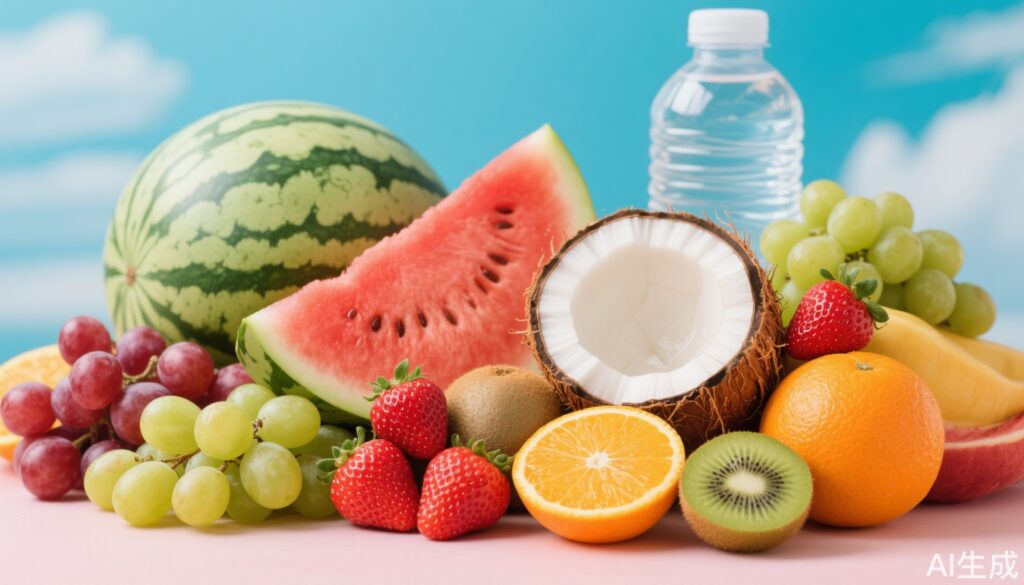Introduction
Maintaining adequate amniotic fluid during pregnancy is crucial for fetal development and maternal health. Amniotic fluid cushions the baby, regulates temperature, and facilitates movement. Pregnant women can support amniotic fluid levels by consuming fruits high in water content, vitamins, and minerals. This article outlines the top 10 fruits that help replenish amniotic fluid efficiently, their nutritional benefits, and consumption recommendations.
1. Watermelon
Watermelon contains over 90% water, making it an excellent hydrating fruit. It is rich in vitamin A and potassium, essential for maintaining fluid balance. The natural sugars in watermelon help promote circulation of bodily fluids. Pregnant women should limit intake to about 200 grams per day to avoid blood sugar spikes. Chilled watermelon enhances palatability and refreshment.
2. Coconut Water
Coconut water is a natural electrolyte-rich drink, with 250 mg of potassium per 100 ml. The clear juice from fresh young coconuts replenishes extracellular fluids effectively, while the coconut meat provides high-quality plant protein. It is best to consume coconut water within two hours after opening to prevent spoilage.
3. Strawberries
Strawberries have 91% water content and 58 mg of vitamin C per 100 grams. Anthocyanins in strawberries improve placental blood circulation. Choose bright red strawberries with fresh green stems, and soak them in lightly salted water for 10 minutes to remove surface residues safely.
4. Purple Grapes
Purple grapes contain resveratrol and abundant fructose, which quickly penetrate cell membranes to hydrate tissues. Eating grapes with skin provides more polyphenols, but pregnant women with gestational diabetes should limit consumption to no more than 15 grapes daily. Freezing grapes enhances their refreshing taste.
5. Oranges
Oranges offer eight times the vitamin C of apples, improving the elasticity of fetal membranes. The fiber in orange flesh aids intestinal water absorption. When juicing, retain the white pith to maximize fiber intake. Consuming 1-2 oranges daily meets hydration needs.
6. Hami Melon
Hami melon is rich in beta-carotene, convertible to vitamin A in the body. Mature fruits can reach sugar levels above 15 degrees Brix. Pairing melon with yogurt enhances calcium absorption. It is best consumed chilled and cut into pieces.
7. Pears
Pears contain sorbitol and malic acid, stimulating saliva production to relieve dry mouth. Steamed pear juice offers more soluble dietary fiber, suitable for pregnant women with sensitive stomachs to drink in small, frequent amounts.
8. Apples
Apple pectin forms a water-retaining gel that slowly releases moisture. Eating apples with the skin provides antioxidants like quercetin. Select apples of medium firmness; discoloration after slicing does not impact nutritional value.
9. Kiwi
Kiwi has three times the vitamin C of lemons. Folate and potassium in kiwi work together to maintain osmotic pressure. Ripe kiwi yields slightly under gentle pressure at both ends. Avoid contact with metal utensils to prevent accelerated enzyme breakdown.
10. Pomelo
Pomelo contains naringin and abundant bioflavonoids that improve microcirculation. Its unique bitter membrane segments can be balanced by pairing with honey for better taste. Pregnant women taking medication should consult their doctor about possible dietary restrictions.
General Recommendations
Pregnant women should aim for a daily fruit intake of 300-500 grams, divided into 3-4 servings. Prioritize seasonal and locally grown fruits, thoroughly washing and peeling them before consumption. For those with gestational diabetes, monitoring blood sugar is essential. In cases of low amniotic fluid, medical fluid therapy may be necessary alongside dietary measures. Maintaining a base intake of 2000 ml of water daily, complemented with a variety of fruits, helps replenish electrolytes and natural sugars, preventing nutritional imbalances from overconsumption of a single fruit.
Conclusion
Incorporating these ten fruits into a balanced diet offers a natural, delicious way to support amniotic fluid levels during pregnancy. Always consider individual health conditions and consult healthcare providers for personalized advice to ensure both maternal and fetal well-being.



